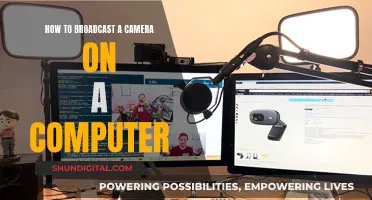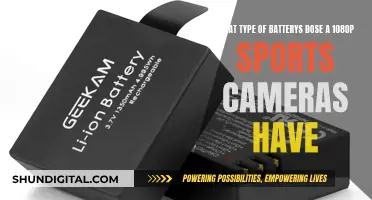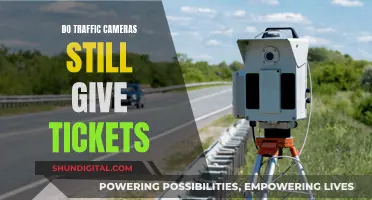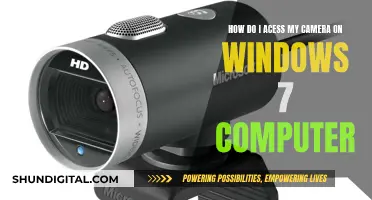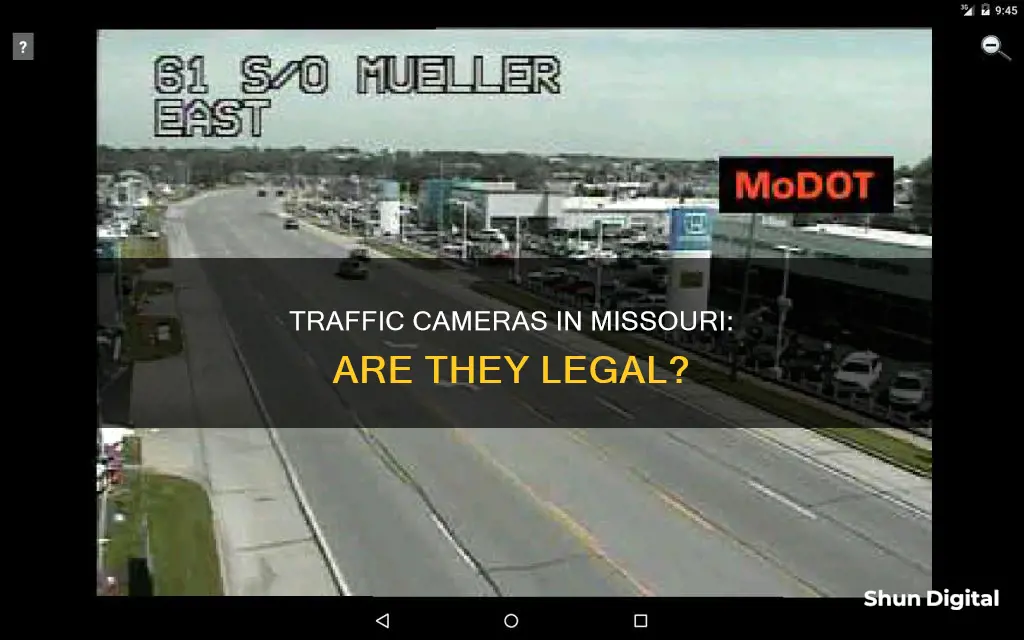
Traffic cameras are a common sight in Missouri, but their legality is a complex issue. Red light cameras, which capture images of vehicles running red lights, and speed cameras, which detect and record vehicles exceeding the speed limit, are both used in the state. While these cameras are legal in some parts of Missouri, their use has been deemed controversial and, in some cases, unconstitutional. The Missouri Supreme Court has ruled that the burden of proof falls on the state to prove that the car owner was driving during a violation, protecting drivers from automatic guilt. The legality of traffic cameras in Missouri ultimately depends on local ordinances, with some cities like Hannibal and Kansas City having their own regulations.
| Characteristics | Values |
|---|---|
| Are traffic cameras legal in Missouri? | Yes, but it's complicated. |
| Are red light cameras legal in Missouri? | Yes, but controversial. |
| Are speed cameras legal in Missouri? | Depends on the city ordinances. |
| Can you get a ticket from a red light camera? | Yes. |
| What happens if you get a red light ticket? | You could pay fines and costs totaling $99 and receive points on your license. |
| How do red light cameras work? | Traffic lights have built-in sensors that work with cameras to capture video and photo footage of traffic violations. |
| Where are red light cameras located? | St. Louis, Kansas City, Springfield, Columbia |
What You'll Learn

Missouri's red light cameras
In the case of City of St. Peters v. Bonnie A. Roeder, the Court took issue with the fact that the city's red-light camera ordinance conflicted with Missouri law, which mandates the assessment of two points for a moving violation. The ordinance in question classified the violation as a moving violation but did not assign any points to the offender's license. The Court suggested that the ordinance could be valid if it assessed the required two points against the driver.
In another case, Sarah Tupper v. City of St. Louis, the Court deemed St. Louis' red-light camera ordinance unconstitutional. The ordinance placed the burden of proof on the defendant, who was typically the vehicle owner, requiring them to prove they were not driving when the violation occurred. The Court asserted that the burden of proof should lie with the state to identify the driver, not presuming the owner was the driver.
Kansas City suspended its use of red-light cameras in 2012 due to legal uncertainty and has not resumed their use. While these rulings don't determine the constitutionality of red-light cameras in general, they do raise questions about the validity of similar ordinances in Missouri. Lawmakers are reluctant to assign points to drivers for violations when it's unclear who was driving without an officer present.
Red light cameras are automated tools used by law enforcement to monitor and enforce traffic laws. They capture images of vehicles running red lights, aiding in promoting road safety and deterring dangerous driving behaviours.
Fight Tennessee Traffic Camera Tickets: Your Rights, Your Defenses
You may want to see also

Missouri's speed cameras
Speed cameras are automated tools used by law enforcement to monitor and enforce traffic laws. They detect and record vehicles travelling over the speed limit, and play a crucial role in promoting road safety by deterring dangerous driving behaviours. While they can result in costly fines for drivers, they also help to improve road safety and reduce the number of accidents.
In Missouri, the use of speed cameras is determined by city ordinances, which means that some parts of the state may use them while others do not. This can be confusing for drivers, who may not be sure whether they are being monitored by speed cameras or not. It is important for drivers to be aware of the locations of speed cameras and to obey traffic laws to avoid fines and contribute to safer roads.
The legality of speed cameras in Missouri is still a matter of debate, with some arguing that they invade privacy and violate drivers' rights. However, proponents of speed cameras argue that they are an effective tool for improving road safety and reducing accidents. As the debate continues, it is important for drivers in Missouri to be aware of the laws and regulations regarding speed cameras and to drive cautiously to avoid any potential fines or legal issues.
Understanding Camera Scene Modes: Unleashing Creative Photography
You may want to see also

Traffic cameras' legality in Hannibal
The use of traffic cameras in Missouri is a complex issue. While Missouri state law permits the use of speed and red light cameras in local traffic enforcement programs, the Missouri Supreme Court has ruled that these programs are unconstitutional unless the state has proof of the driver's identity at the time of the offence.
Hannibal, a city in Missouri, has a significant number of traffic cameras installed due to the high volume of traffic and red-light violations. The Hannibal Police Department states that the US 61 corridor through Hannibal sees an average daily traffic count of over 26,000 vehicles, with more than 20 red-light violations in a 24-hour period at a single intersection.
In response to this issue, Hannibal implemented the Red Light Camera Program in December 2007. This program has successfully reduced the number of red-light violations and traffic crashes, not only at intersections with cameras installed but also at nearby intersections. The cameras are located at the following intersections: US 61/Hwy 168 and Diamond Blvd, US 61/West Ely Rd and Pleasant St, US 61/Market St and Paris Gravel Rd, and US 61/ Rt. MM and James Rd.
The legality of the traffic cameras in Hannibal is a matter of debate. While the city has implemented the program, it is unclear if it complies with the Missouri Supreme Court ruling. The Governor's Highway Safety Administration states that Missouri leaves the decision to use speed cameras up to city ordinances, creating confusion about the legality of the cameras in Hannibal.
Traffic Cameras on Route 146: Are Motorists Being Watched?
You may want to see also

Missouri Supreme Court's ruling
The Missouri Supreme Court ruled that there were constitutional or legal issues with three cities' traffic-camera ordinances: St. Louis, St. Peters, and Moline Acres. The Court identified issues with how these cities were implementing their programs and offered guidance on how to use the cameras in a lawful and constitutional manner.
St. Louis
The city of St. Louis issued tickets to the owner of a vehicle shown running a red light on a traffic camera. The ticketed individual could then argue that they were not driving the vehicle at the time of the violation. The Court found St. Louis' red-light ordinance unconstitutional as it shifted the "burden of proof" to the defendant to prove that another person was operating the vehicle. St. Louis officials stated that they plan to rework this ordinance to comply with the Court's ruling.
St. Peters
Cameras in St. Peters captured photos of both the vehicle license plate and the driver, which were then used to issue a ticket to the vehicle's owner for running a red light. The Court ruled that the part of the city's red-light ordinance that stated no points would be assessed against a driver's record is invalid and runs contrary to state law, which requires two points to be assessed for moving violations. The majority agreed to strike the no-points provision, but upheld the rest of the law as valid. As a result, violators could now incur points on their driving records.
Moline Acres
Moline Acres had an ordinance that allowed the use of traffic cameras to identify vehicles speeding. This ordinance categorized such infractions as "non-moving" violations, which would not result in points on a driver's record. The city argued that it did not issue tickets for "moving violations" and that tickets were given to vehicle owners for allowing their vehicles to speed, regardless of who was driving. The Court ruled that the ordinance made an unconstitutional presumption that a vehicle owner granted permission to another person to speed using their vehicle. While the Supreme Court did not strike down the ordinance entirely, it noted that the city must prove beyond a reasonable doubt in court that a vehicle owner gave permission for another driver to speed in their vehicle.
Fighting Speeding Camera Tickets: Is It Worth the Cost?
You may want to see also

Traffic camera restrictions
The use of traffic cameras is a highly controversial topic in the United States, with many states implementing their own unique restrictions on their use. Traffic camera restrictions are often informed by considerations of public safety, privacy, and drivers' rights. While some states have chosen to ban automated traffic cameras altogether, others have imposed limitations on how and where law enforcement can utilise these devices.
In Missouri, the legality of traffic cameras is a complex issue. While the state does allow the use of speed and red-light cameras in local traffic enforcement programs, there are several important restrictions that govern their use.
One significant restriction in Missouri pertains to the burden of proof. The Missouri Supreme Court has ruled that for a traffic violation captured by a camera to be enforceable, the state must be able to prove the identity of the driver at the time of the offence. This means that simply capturing a vehicle committing a violation is insufficient, and the state must also be able to establish who was driving.
Additionally, Missouri has specific requirements for the registration and operation of automated photo red-light enforcement systems. These systems must be registered with the Missouri Department of Transportation prior to installation, and there are strict guidelines regarding their placement, markings, and signage. The systems must also be capable of producing high-resolution colour digital recorded images that clearly show the traffic control signal, the offending vehicle, and the rear license plate.
Furthermore, Missouri law prohibits these systems from capturing images of the front license plate or the driver's face. The law also stipulates that the images captured by these systems are confidential and are not to be deemed public records.
It is worth noting that the use of traffic cameras in Missouri may vary depending on the specific city or region, as local ordinances can play a role in their implementation.
Understanding the specific restrictions in Missouri is crucial for drivers, as it can help them effectively challenge any traffic violations captured by cameras.
Square Mode Photography: Capturing Unique Moments with a Twist
You may want to see also
Frequently asked questions
Red light cameras in Missouri are controversial but legal. You can get a ticket from one, but the burden of proof falls on the state to prove the car owner was driving at the time of the violation.
You could pay fines and other costs totaling $99 and receive points on your license. You can avoid the points by completing a driver improvement program (DIP).
Traffic lights have built-in sensors that work with red light cameras to capture video and photo footage of traffic violations. The camera will photograph your license plate number and link it to a record with the date and time of the incident and the amount of time since the light turned red.
While red light cameras are legal in Missouri, the state leaves it up to city ordinances to decide whether to use them. For example, Kansas City and St. Louis have red light cameras, while they are not used in other parts of the state.


